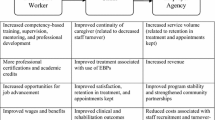Abstract
The existence of a workforce crisis in behavioral health has been recognized for decades. However, workforce problems often have been viewed as too large, too complex, and too daunting for individual states to tackle. This article reviews the progress of one state in systematically strengthening its workforce as part of a federally supported effort to transform mental health services. The workforce priorities in Connecticut are identified and the specific workforce transformation projects and their impact are described. The success in sustaining these initiatives after cessation of federal support is reviewed. The authors conclude by offering five recommendations to guide comprehensive state workforce development. This work has particular salience for the many states across the nation that have identified behavioral health service and workforce needs as obstacles to comprehensive health care reform.
Similar content being viewed by others
Notes
SAMHSA (2014) recently added workforce development as one of six goals in its strategic plan, Leading Change 2.0: Advancing the Behavioral Health of the Nation 2015–2018.
References
Cannata, E., & Hoge, M. A. (2012). Higher education reform on evidence-based practices: The Connecticut transformation initiative. Report on Emotional & Behavioral Disorders in Youth, 12(1), 18–23.
Department of Health and Human Services (DHHS). (2003). New Freedom Commission on mental health: Achieving the promise: Transforming mental health care in America. Final Report. DHHS pub no SMA-03—3832. Rockville MD, Department of Health and Human Services. http://govinfo.library.unt.edu/mentalhealthcommission/reports/FinalReport/downloads/downloads.html
Fixsen, D. L., Naoom, S. F., Blase, K. A., Friedman, R. M. & Wallace, F. (2005). Implementation research: A synthesis of the literature. Tampa, FL: University of South Florida, Louis de la Parte Florida Mental Health Institute, The National Implementation Research Network (FMHI Publication #231).
Focus On Recovery-United, Inc. (FOR-U). (2010). Connecticut Recovery Employment Consultation Service (C-RECS) Final Report 2008–2010.
Hoge, M. A., Migdole, S., Cannata, E., & Powell, D. J. (2014). Strengthening supervision in systems of care: Exemplary practices in empirically supported treatments. Clinical Social Work Journal, 42(2), 171–181.
Hoge, M. A., Migdole, S. J., Farkas, M. S., Ponce, A., & Hunnicutt, C. (2011). Supervision in public sector behavioral health: A review. The Clinical Supervisor: An Interdisciplinary Journal of Theory, Research, and Practice, 30(2), 183–203.
Hoge, M. A., Morris, J. A., Stuart, G. W., Huey, L. Y., Bergeson, S., Flaherty, M., & Madenwald, K. (2009). A national action plan on workforce development in behavioral health. Psychiatric Services, 60(7), 883–887.
Hoge, M. A., Stuart, G. W., Morris, J., Flaherty, M. T., Paris, M., & Goplerud, E. (2013). Mental health and addiction workforce development: Federal leadership is needed to address the growing crisis. Health Affairs, 32(11), 2005–2012.
Institute of Medicine (IOM). (2010). Redesigning continuing education in the health professions. Washington, DC: The National Academies Press.
Leff, S., Cichocki, B., Chow, C. M., & Lupton, C. (2014). Infrastructure change is not enough: An evaluation of SAMHSA’s mental health transformation state incentive grants. Psychiatric Services, 65(7), 947–950.
MANILA Consulting Group, Inc., & Human Services Research Institute (HSRI). (2011). Final report. Evaluation of the Mental Health Transformation State Incentive Grant Program. McLean, VA.
Nelson, G., Kloos, B., & Ornelas, J. (Eds.). (2014). Community psychology and community mental health: Towards transformative change. New York: Oxford University Press.
Rehmer, P. (2006). A comprehensive mental health plan for the State of Connecticut. Submitted to the Substance Abuse and Mental Health Administration, Center for Mental Health Services.
SAMHSA. (2005a). SAMHSA advisory. SAMHSA News. $92.5 Million Awarded for Mental Health Transformation State Incentive Grants.
SAMHSA. (2005b). Transforming mental health care in America—The federal action agenda: First steps. Rockville, MD: Author.
SAMHSA. (2009). Workforce development: Transformation in action. Rockville, MD: CMHS Transformation Center.
SAMHSA. (2012). SAMHSA’s working definition of recovery updated March 23 2012. Rockville, MD: Author.
SAMHSA. (2014). Leading change 2.0: Advancing the behavioral health of the nation 2015–2018. http://store.samhsa.gov/leadingchange/feedback/SAMHSA-Leading-Change%202-0.pdf
Silveira, P. R., Bugella, B., Paris, M., & Hoge, M. (2007). Connecticut moves to transform its workforce. Mental Health News, 9(2), 37–42.
Tebes, J. K., Matlin, S. L., Migdole, S. J., Farkas, M. S., Money, R. W., Shulman, L., et al. (2011). Providing competency training to clinical supervisors through an interactional supervision approach. Research on Social Work Practice, 21(2), 190–199. doi: 10.1177/1049731510386827. http://rsw.sagepub.com/content/21/2/190
Wolf, J., Lawrence, L. H., Ryan, P. M., & Hoge, M. A. (2010). Emerging practices in employment of persons in recovery in the mental health workforce. American Journal of Psychiatric Rehabilitation, 13(189–207), 2010.
Acknowledgments
This work was supported in part by the State of Connecticut through the SAMHSA Mental Health Transformation State Incentive Grant (MHT-SIG) No. SM57456. The authors acknowledge Thomas Kirk, Patricia Rehmer, and Barbara Bugella for their leadership in making this work possible.
Author information
Authors and Affiliations
Corresponding author
Rights and permissions
About this article
Cite this article
Hoge, M.A., Wolf, J., Migdole, S. et al. Workforce Development and Mental Health Transformation: A State Perspective. Community Ment Health J 52, 323–331 (2016). https://doi.org/10.1007/s10597-015-9953-6
Received:
Accepted:
Published:
Issue Date:
DOI: https://doi.org/10.1007/s10597-015-9953-6




